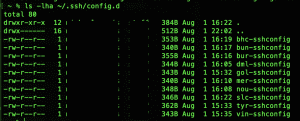We have hundreds of clients where I work, and now some of us, finally, get to use Macs. We use mRemoteNG for managing ssh connections on Windows, but we needed a solution for Macs. We needed an easy-to-use solution that allowed us to control who had access where.
One of the issues with how our mRemoteNG is currently configured is that we have one .xml file that we import into mRemoteNG and that person now has all servers for all clients setup. Which sounds nice, but not as secure or manageable as we’ve learned we need.
Luckily on Mac, ssh has a config file that handles includes built-in, and with a little thinking becomes the perfect solution. Basically, add a config file, add an include for a subdirectory, and then add client config files as needed.
Note: I’m assuming you are using keys for access. The user’s public key(s) still has to be added to the servers for all of this to work. If you use a different key per client, use IdentityFile to define keys per hostname.
Setup
- Navigate to ~/.ssh
cat ~/.ssh - Create config file
touch config - Create subdirectory
mkdir config.d - Edit config file
vi config- Use
ito enter into edit mode, and then add at the top of the config file
Include config.d/* - Use
escto exit edit mode, Save and exit
:wq
- Use
- Go into subdirectory
cd config.d - Add sub-files as needed.
touch xxx-sshconfig
 Now that we have the structure put together, using some naming schemes makes this all come together. We use a 3-letter code for our clients, so each config file is xxx-sshconfig. We store the config files with the client passwords in our password manager. If you have access to the passwords, you also have access to this config.
Now that we have the structure put together, using some naming schemes makes this all come together. We use a 3-letter code for our clients, so each config file is xxx-sshconfig. We store the config files with the client passwords in our password manager. If you have access to the passwords, you also have access to this config.
The other important naming scheme you want to set up is the host line for each server. If you use a naming scheme, then you’ll just know what it is, without having to look it up.
Basic ’empty’ file:
# Client:
Host
Hostname
User
Host
Hostname
User
Host
Hostname
User
Example:
# Client: BUR -
Host bur-prod-01
Hostname sss.prod-01.domain.tld
User username01
Host bur-prod-02
Hostname sss.prod-01.domain.tld
User username02
Host bur-stage-01
Hostname sss.stage-01.domain.tld
User username03
IdentityFile ~/.ssh/id_rsa
And finally, how to use it
ssh bur-prod-01
There is A LOT more that can be configured in these ssh configs, see the official documentation for more ideas and solutions.
